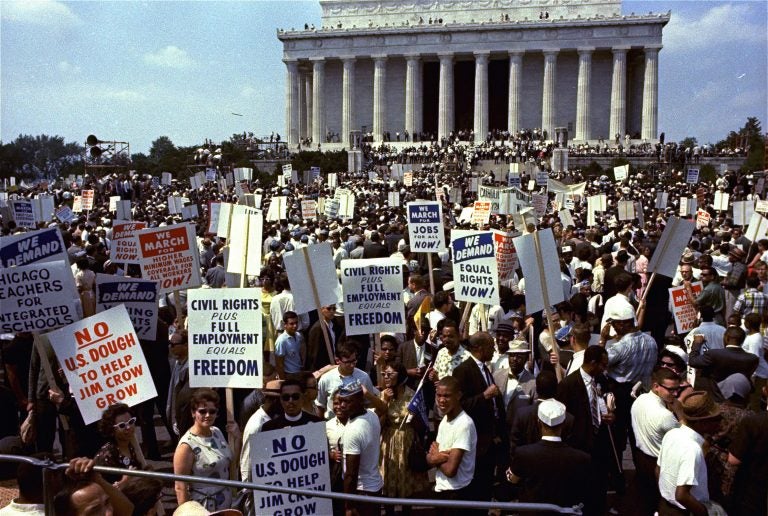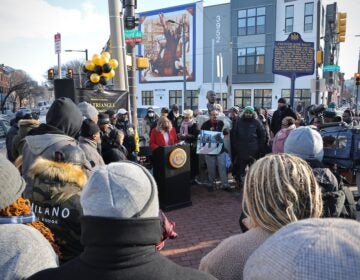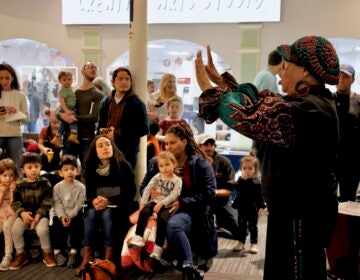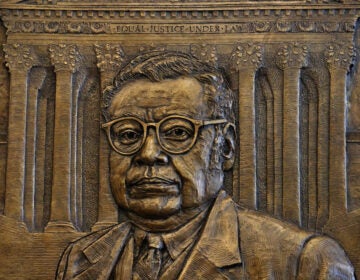The myth of post-racial America
Civil disobedience is our obligation, not our right. If we do not stand up, ignorance wins. As long as we feel inequality, we cannot say that we live in a post-racial society.

Crowds are shown in front of the Lincoln Memorial during the March on Washington for Jobs and Freedom, August 28, 1963. (AP Photo)
In observation of the life and death and legacy of Dr. Martin Luther King, Jr., NewCORE and Gwynedd Mercy University are presenting “Examining ‘Post-Racial’ America” on Feb. 28, a public discussion that will explore the feasibility of a post-racial society and the role civil discourse will play in achieving that ideal. WHYY is publishing a series of essays on that theme.
—
When I heard from someone that we live in a post-racial America, I had to consider what this truly meant. By definition, it suggests that we live in a country in which racial preference, prejudice, and discrimination do not exist; that we live in a country that treats everyone equally, offers every person the same opportunities, and does not judge an individual by the color of their skin.
I suspected that the person who used the term did not understand the dynamics of this great land, instead choosing to perpetuate an idyllic view of society. However, nearly 50 years after the death of Martin Luther King, Jr., a civil rights leader who worked so hard to create a post-racial America, I cannot see how someone would suggest that it actually exists.
Over the past five decades, we have had very little change in how the color of one’s skin affects everyday life. For example, socioeconomic status is still correlated to race; though redlining has been outlawed, minorities are still living in the poorer sections of every city. Those areas have a higher rate of unemployment, leading to a lower tax base, and subsequently a poorer educational system. To argue against the perpetual nature of racism is to suggest that race has nothing to do with a lower quality of life in America. Sublime, but untrue.
King listened to poor, working-class Americans, recognizing that, while we had created laws to promote equality, these laws were being disregarded by the very people who created them. He showed people that, while we live in a capitalist society, not everyone had an opportunity to succeed and thrive. Rich, old, fat, white men were running the country, repressing the values and beliefs of a strong but conscious minority. He pushed for a change in American values, explaining that to have capitalism means the existence of both the haves and have-nots, and evinced that black Americans were the ones who had nothing. He pushed for a change in society’s structure, but warned that this change could not happen without a serious change in values. In a sense, King is the godfather of civil discourse. He understood that people do not like change but that it was necessary for equality.
We live in a country that was founded by the downtrodden rising up and making their own change. People who were oppressed decided that they no longer wanted to live under a government that held them as second-class citizens, did not listen to their cries, and restricted their way of life. We forcefully left that government to start our own, allowing us to make our own rules. It is a violent history, and one that we would not like to repeat. However, that does not mean that we should avoid civil discourse. In fact, if we are to follow King, we should do just that: Stand up and be heard, even when the message is not that of the majority.
What do we tell our children when they are treated poorly? Do we not tell them to stand up and advocate for themselves? Why, then, would we not do that as a country? Why would we work against these ideals, simply because we do not like the message? It should be our goal to point out the inequalities and ask that the powers that be make them right.
What are we fearful of? If we truly live in a country that promotes equality, why are we so upset when people who have been neglected decide to stand up and be counted? Are we threatened? When Eric Garner was killed with an illegal chokehold, we collectively sighed. When Michael Brown was shot and killed, we questioned how something like this could happen. The fact is, they happened because post-racial America is an aspiration, not a reality.
People are not born ignorant; ignorance is recognition of the problem and a refusal to change. Ignorance is fought with education. We all have the ability to educate, but we all have to be willing to serve as the teacher. Civil disobedience is not people complaining; it is a method of education that forces us all to listen, to see the inequality, to recognize the ignorance, and to work towards change. If we want a post-racial society, we need to eliminate ignorance.
Civil disobedience is not our right, it is our obligation. If we do not stand up, ignorance wins. As long as we feel the palpable beat of inequality, we cannot say that we live in a post-racial society. As Ta-Nehisi Coates stated in 2015, the issue is not treating people equally. The real issue is getting to a point where race does not matter.
—
Patrick McGrain, Ph.D., is an associate professor and program coordinator of criminal justice at Gwynedd Mercy University.
WHYY is your source for fact-based, in-depth journalism and information. As a nonprofit organization, we rely on financial support from readers like you. Please give today.




